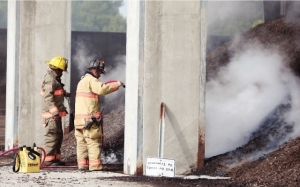Firefighters respond to call at compost pile near facility
By Ethan Smith
Published in News on September 8, 2015 1:46 PM

News-Argus/CASEY MOZINGO
Carnell Britt and David Grice work to put out a smoldering fire in a mulch pile at the city of Goldsboro's Biosolids Compost Facility on Westbrook Road Monday morning. A Class A foam is used on the pile to smother the burn, and a rake is used to move around the mulch. Although such fires are uncommon at the facility, it is common for a mulch pile to begin to burn on the inside if it sits untouched for a long period of time.
The Goldsboro Fire Department responded to a mulch fire at the city's compost facility at 200 Westbrook Road just after 10 a.m. Monday morning.
Assistant Fire Chief James Farfour said a passer-by called in the fire as a building fire, but once firefighters arrived at the scene, they discovered a smoldering mulch pile in the open-air shelter beside the compost facility.
The fire was most likely caused by heat generated by the decomposition of the mulch in the large pile, Farfour said.
"Mulch piles catching on fire from decomposition is very common, but it's more noticeable in the winter," Farfour said.
Engines 1 and 4 responded to the call, and firefighters at the scene got the fire under control by spraying Class A foam on the pile of mulch.
"Class A foam is a penetrating foam that's made to seep in and put out the fire," Farfour said. "Class A foam is different from Class B foam, which is what most people think of when they think of firefighters spraying foam on a fire, but Class B foam is a smothering foam instead of a penetrating foam. Class B foam is what you see on TV shows most of the time."
After getting the fire under control by using foam, firefighters and compost facility workers spread out the mulch pile to ensure there was no fire still burning under the large pile.
"You have to spread it out because there could be a tunnel all the way through that pile that could let the fire keep burning if we don't spread the pile out," Farfour said.
Farfour said the fire department rarely has to respond to mulch fires at the compost facility because the employees at the facility work to spread around the mulch piles so the decomposition of a stagnant pile does not cause a fire.
"The shade from the shelter they have here usually helps to keep the mulch cooler, so fires aren't all that common out here," Farfour said.
